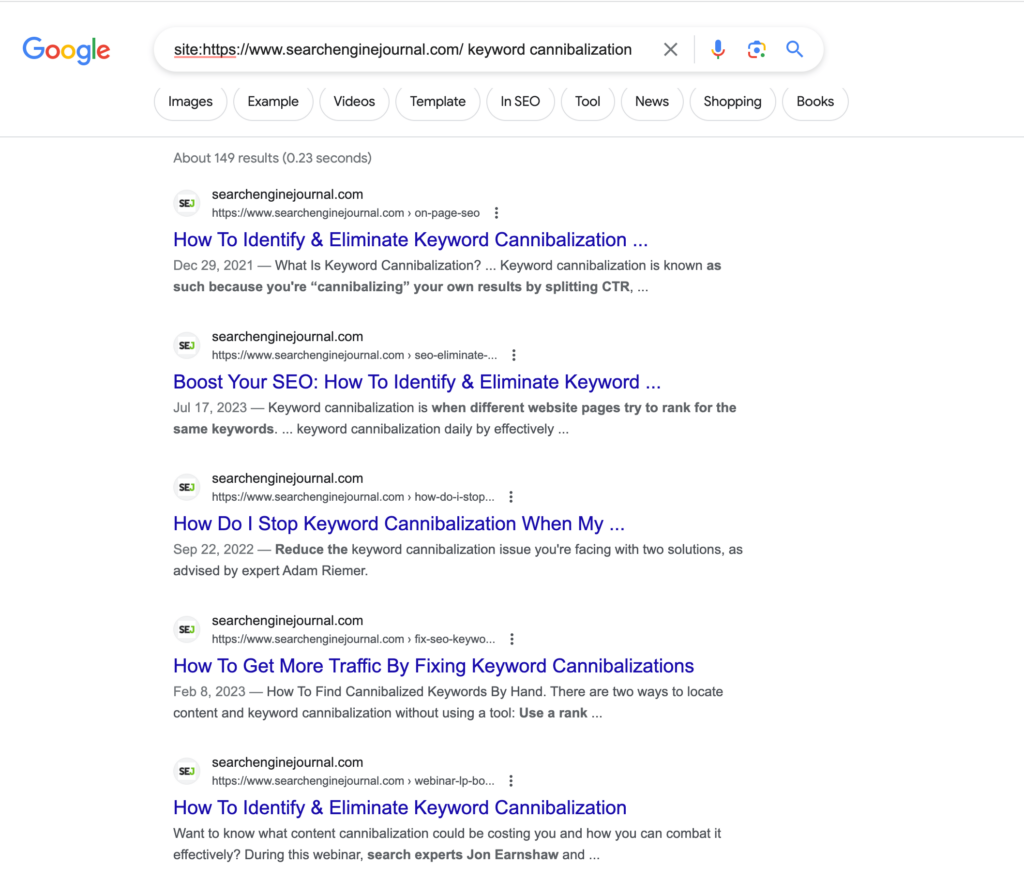
Keyword cannibalization is a major problem for any website that is looking to improve its search engine rankings. It occurs when multiple web pages on a site are optimized for the same search phrase, which can result in decreased site visibility and poor search rankings. This phenomenon can be caused by using the same keywords on multiple pages, making it difficult for search engines to determine the most relevant page for each query.
Unfortunately, keyword cannibalization is not as easy to detect as it might seem at first glance. It can come in many forms, including using the same keywords in titles, meta tags, and page text, and creating too many similar pages on a site. As a result, webmasters can waste a lot of time and resources promoting pages that ultimately don’t deliver the expected results.
But don’t panic in advance, because in this article we will tell you how to find and fix SEO keyword cannibalization, as well as give tips on how to prevent it.
So let’s get started!
What is Keyword Cannibalization in SEO?
Keyword cannibalization refers to the situation where two or more pages on the same site exist that are shown for the same search queries. This may occur because these pages use the same keywords – in meta tags, in page titles, and in content text. This makes it difficult for search engines to understand which page they should rank in search results when a specific phrase is requested.
Main types and examples of keyword cannibalization
SEO specialists define the following types of keyword cannibalization:
- • Internal cannibalization: it happens when a site uses similar or the same keywords for different pages or page elements. This can lead to poor SEO performance as search engines may become confused about which page or page element to show in search results.
- • External cannibalization: occurs when two or more sites use the same or similar keywords. This can reduce the visibility of each site in search results because it is difficult for search engines to determine which site is most relevant for each query.
- • Technical cannibalization: refers to the use of the same or similar meta tags, titles, and other elements on different pages of the site. It can also reduce SEO effectiveness because search engines may not understand what information to display for each query.
For example, a site that is optimized for search engines for the keywords “buy phone” and “buy phones” may experience cannibalization if it is also optimized for the keywords “buy smartphone” or “buy mobile phones.” In this case, each of these keywords can take away some of the search traffic from the other.
If a site uses the same or similar keywords in Title and Description meta tags, this can also lead to cannibalization. For example, if a product page uses the keyword “phone” in both tags, then the search engine may not know which product the user wants to see – a phone, a smartphone, or another product.
To better understand this phenomenon, it is worth familiarizing yourself with the other important side of this process, namely the search intent in SEO.
Why keyword cannibalization is bad for SEO?
SEO Keyword cannibalization can lead to a number of problems for a website:
- • Reduced site visibility. Search engines may simply not show such a site in search results for some queries, as they are confused by the presence of duplicate content on different pages.
- • Reduced positions in search results. Even if a site shows up in search results, pages with cannibalized keywords often rank lower than they would have if they didn’t have duplicate content.
- • Increased competition. Having multiple pages optimized for the same queries creates unnecessary competition between them, which in turn reduces the chances that any of those pages will rank high in search results.
To avoid these problems, it is necessary to conduct keyword analysis, optimize each page for a specific group of queries, and eliminate keyword cannibalization. Our SEO company specialists are happy to help you with this.
How to Find Cannibalized Keywords?
There are several ways to find cannibalized keywords on your site:
- • Using a search query analysis tool: Google Search Console offers a search query analysis tool that can help you detect cannibalized keywords.
- • Using third-party tools: Ahrefs, SEMrush, and Moz offer keyword research tools that can help identify cannibalized keywords on your site.
- • Manual analysis: You can manually go through your site and check if the same keywords are being used on different pages. If so, then these keys may be cannibalized.
- • Regular monitoring: Monitor your site and keywords to detect any changes in rankings or visibility that may indicate keyword cannibalization.
Detecting cannibalized keywords is an important step in optimizing your site for search engines. Using a variety of techniques, you can identify the presence of cannibalized keywords and take steps to eliminate them to improve your site’s search engine visibility and ranking.

9 Steps to Fix Keyword Cannibalization
Now let’s look at basic steps that will help correct SEO keyword cannibalization on your site and improve its visibility in search engine results.
- 1. Check your website: Review your site for duplicate keywords or duplicate content that could cause cannibalization. Determine which pages are competing for the same keyword. This will help you understand which pages need to be optimized.
- 2. Create a site structure: Develop a clear site structure that will help organize information and keywords.
- 3. Determine the most relevant page: Select the most relevant page for each keyword. This will help search engines understand which page to show to users.
- 4. Use H1-H6 tags: Use H1-H6 heading tags to structure your content and point to the most important keywords.
- 5. Use a canonical tag: Use a canonical tag to tell search engines which page should be considered the primary page for each keyword.
- 6. Divide content: If you have duplicate content on different pages, redistribute it so that each page offers unique information. Set up a 301 redirect from the cannibal pages to your preferred page to tell Google that they have been replaced.
- 7. Remove duplicate content: Remove any duplicate content that may cause cannibalization and rewrite it to be unique for each page.
- 8. Update internal links: Check the internal links on your site and make sure they point to the correct pages. Avoid linking to pages that compete for the same keyword.
By following these steps, you can optimize your site for search engines, eliminate duplicate content and keyword cannibalization, improve linking and anchor connections, and improve SEO performance. Don’t forget to check the results of your work and adjust your actions in accordance with the data received.
How to Avoid Keyword Cannibalization?
In order to prevent keyword cannibalization on your site, you need to conduct a thorough keyword analysis and optimize content for SEO. This takes time and effort, but in the long run, it will help improve your site’s visibility and ranking in search engines, as well as reduce advertising and promotion costs.
So, to avoid keyword cannibalization, you should follow a few basic rules:
- • Create a clear keyword structure: The first step in preventing cannibalization is to create a clear and logical keyword hierarchy on your website. You must determine which pages and sections of your website are aimed at attracting which focus keyword, and create a structure that reflects that priority. This will help avoid duplication of content and optimize each page for a specific group of requests.
- • Use different keywords on each page: Avoid duplicating keywords in meta tags, headings, and text. Make sure every meta tag, title, and text is unique for each page. This will prevent duplication and competition between pages for the same keyword.
- • Using different anchors (text that leads from one page of your website to another) with different keywords for links between pages to point to different keywords and reduce cannibalization. This will improve link juice and distribute keywords throughout the site.
For content planning and keyword research, you can use the following tools:
- • Google Trends: allows you to find out what queries are popular in a certain region and time. This will help you determine the relevance and interest of certain keywords.
- • Google Keyword Planner: this will help you find new keywords, and evaluate their search volume and competition. This will help you choose the most relevant keywords for your site.
Also, to prevent keyword cannibalization, we recommend performing keyword mapping (the process of linking each keyword to a specific page on your site). This can help you prevent keyword duplication and ensure that each page is optimized to attract its target audience, meaning search engines will have a better idea of which page to show for each query.

Tips & tricks you should know to prevent keyword cannibalization
Let’s discuss some useful tips that you can use to prevent your keyword cannibalization on your website or blog, and thus improve the effectiveness of your SEO strategy.
- • Analyze your keywords: Before you start optimizing your site, do keyword research and determine which ones are the most popular and relevant for each page. This will help you avoid conflicts between pages.
- • Use SEO tools: There are various tools that can help you determine which keywords are already being used on your site or by competitors.
- • Create unique content: Avoid duplicating content on different pages of your site. Each page should offer unique information and be aimed at a specific audience. Make a content gap analysis of your website and do not copy content from other sites or blogs.
- • Optimize meta tags: Make sure each page has unique meta tags, including title and description. They should contain keywords that most accurately describe the content of the page. This will help search engines better understand the content of each page and determine its relevance to a specific query.
- • Use keyword clustering: Divide your keywords into groups and optimize each group on a separate page. This will help search engines better understand the structure of your site and determine the relevance of each page.
- • Do link optimization: Interlinking your website pages will improve your website’s visibility in search engines. Overall, improving your site’s link profile can help increase its authority and search engine rankings, which can help you attract more visitors.
- • Track results: Regularly monitor your pages’ rankings in search results and analyze which pages are competing for the same keyword. If you find keyword cannibalization, take steps to eliminate it.
Proper content planning and keyword distribution across site pages are important factors to avoid the cannibalization problem and improve your relevance in SEO.
Keyword Cannibalization in SEO: Final Thoughts
Keyword cannibalization is a major concern for SEOs and website owners. This phenomenon can lead to a decrease in the site’s visibility in search engines and a loss of ranking positions. However, understanding the causes and consequences of cannibalization allows us to develop effective strategies to prevent and eliminate it.
To prevent cannibalization, you need to conduct a thorough keyword analysis and choose the most suitable ones for your site. It is also important to monitor the internal and external optimization of the site, use the semantic core, and create high-quality content.
If cannibalization does occur, you should conduct an analysis and determine which keywords are competing with each other and reducing the visibility of the site. You can then use various methods to fix the problem.
It is important to remember that cannibalization is not the end of the world. If you encounter this problem, do not despair and do not give up. With the right approach and patience, you can successfully resolve it and return your site to its position in search.
Mellow Promo offers content marketing services that will help you prevent keyword cannibalization, improve SEO, and attract more visitors to your site. Our specialists will analyze your site, select the most suitable keywords, and develop a promotion strategy that will help you achieve the desired results.
We offer a wide range of services, including content creation and optimization and much more. By contacting us, you can be sure your website will rank high in search results and attract more customers.





